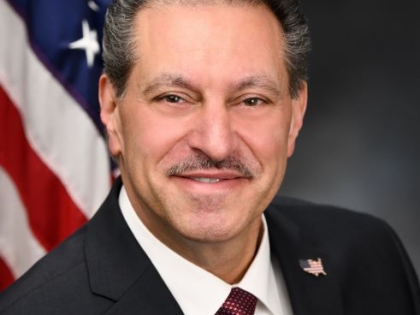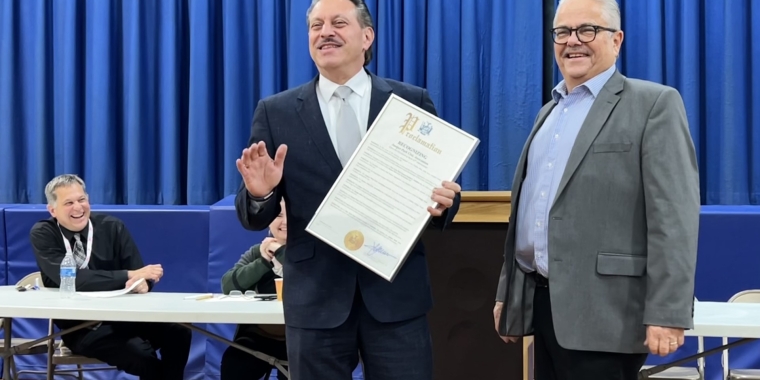
Statement by NYS Senator Joseph P. Addabbo, Jr. on the Close of the 2015 New York State Legislative Session
June 26, 2015
Queens, NY (June 26, 2015) NYS Senator Joseph P. Addabbo, Jr. made the following statement on the official end of the 2015 New York State Legislative Session, which closed down in the Senate at 11:55 p.m. on June 25th:
“Whether you want to call it ‘The Big Ugly,’ ‘The Big Lovely,’ or something in between, I think we can all agree that the end of the 2015 legislative session brought with it a number of successes and a number of failures, particularly with regard to the big ticket items that were the focus of such intense negotiations over the last week.
“As a member of the Senate Education Committee, I was pleased that some reforms were made to Common Core. These reforms in my opinion are a direct result of parents, teachers, administrators and students speaking out against certain aspects of the state standardized tests. Test questions and correct answers will now need to be provided to parents and educators in a timely fashion, hopefully by July 1, as well as the general student success rate on the questions. In terms of teacher evaluations, growth scores for educators will now need to consider the fact that some of their students are disabled, living in poverty, learning English as a second language, and may be otherwise facing basic obstacles to immediate academic success beyond their teacher’s control. In addition, the State Education Commissioner is required to conduct a comprehensive review of the Common Core standards, to be completed by next June with recommendations for possible modifications, that includes input from education stakeholders on curriculum materials, the age and grade appropriateness of the standards, and other issues of concern.
“These are all positive steps, but I remain very disappointed that the final Common Core-related education reforms did not decouple education funding from teacher evaluations, or give more time for the new Annual Professional Performance Review (APPR) standards for teachers and principals to be developed and adopted by school districts across the state. These issues and others regarding Common Core must be addressed during our next legislative session.
“On other education issues, I appreciate that mayoral control of New York City schools has been extended for one year, and that we will now have an additional opportunity to make reforms to the policy to better benefit our children and educators. While agreement was not reached on the Education Tax Credit, which would have allowed for financial assistance to both public and private schools, $250 million was set aside for non-public schools to help them with state-mandated transportation costs, textbook purchases, test administration and other expenses.
“In addition, up to 50 additional charter schools could now potentially open in New York City, although the statewide cap of 460 schools will remain in place. While my primary focus will always be on adequately funding and supporting our public school system, I also strongly believe children in private and charter institutions deserve an equal chance to succeed academically and that parental choice must be respected -- although never fully subsidized by taxpayers.
“Moving from education to housing – another area that inspired much debate in the closing weeks of session – I am glad the laws governing rent-controlled and stabilized apartments were extended for four years, giving some measure of security to the millions of tenants in New York City and elsewhere who were fearful of losing their homes when the regulations expired on June 15th. The final agreement on this issue included a slight increase from $2,500 to $2,700 in the legal rent threshold for vacancy decontrol, and enhanced penalties for landlord harassment of tenants. I still believe there is much more to be done to reform the rent laws and keep affordable apartments from being removed from the system and rising to astronomical market rates.
“I am also pleased the New York City J-51 program, which provides tax incentives for developers to make improvements to multiple dwellings, will remain in place through January of 2019, and that partial real property tax abatements for New York City co-op and condominium owners will continue through 2018. These tax breaks are important to helping middle-income co-op and condo dwellers make ends meet and providing equity in the City’s property tax structure.
“While negotiations on education, housing, property taxes and economic development programs seemed to dominate the end of session, it’s important to remember that we also addressed a variety of other issues that may not have claimed the headlines or led to long stand-offs between opposing viewpoints.
“We were successful in passing legislation to better combat sexual assault on private college campuses, and we passed bills to combat elder abuse and help ensure more support for family members and friends who serve as informal caregivers to loved ones released from hospitals. A measure was approved by both houses that will help disabled individuals save money for their future, and another bill will help pregnant women gain more immediate access to health care for themselves and their unborn babies. My bill to extend building permits for homes affected by Hurricane Sandy was approved, along with legislation to ensure that there is greater oversight and transparency in how New York State disburses federal Sandy funds.
“These may not be the bills that everyone was talking about towards the end of the 2015 session, but they are still vital measures that will address some very important needs of individuals and families throughout our State. And that, in the end, is what every legislative session is supposed to be all about.”
Share this Article or Press Release
Newsroom
Go to Newsroom
Addabbo Honors Juniper Park Civic Association
October 23, 2023

Addabbo Honors Pastors on the Anniversary of Their Ministry
October 23, 2023

Addabbo Commemorates Catholic Education
October 23, 2023
